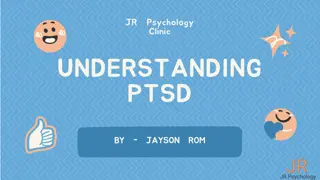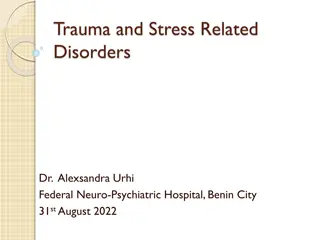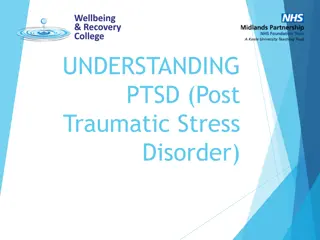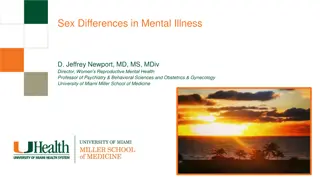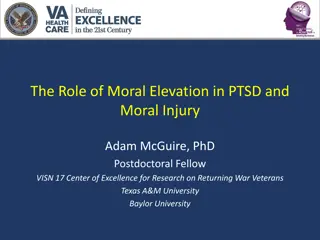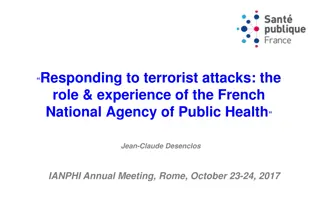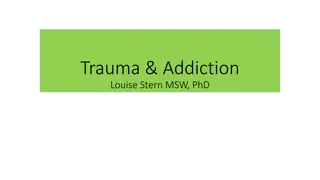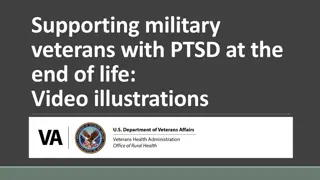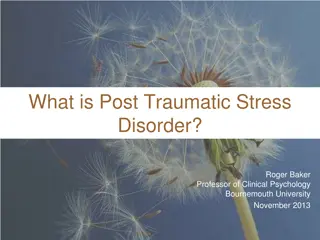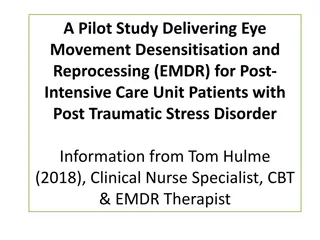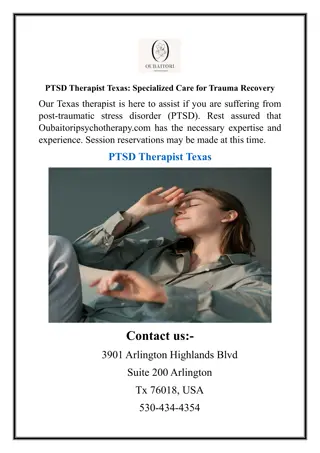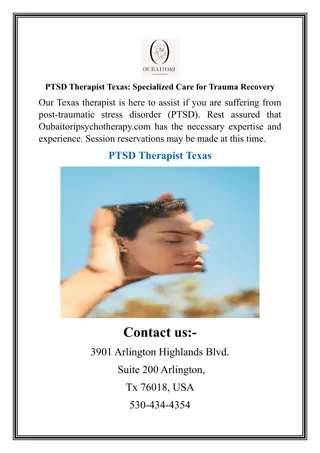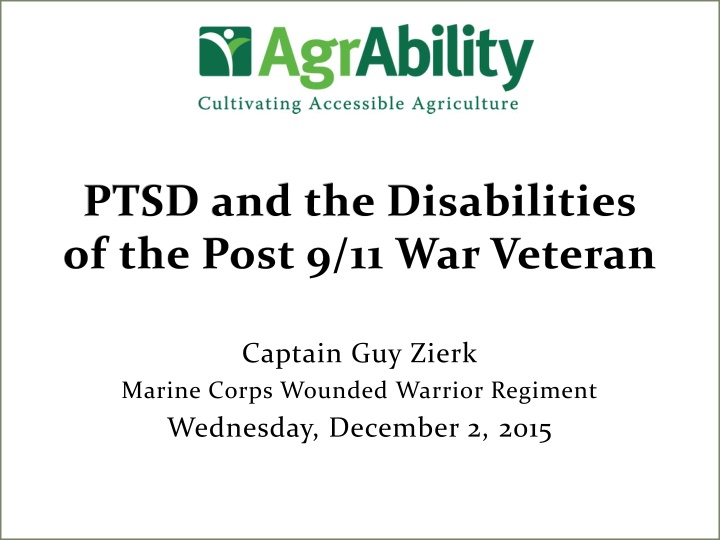
PTSD and Disabilities of Post-9/11 War Veteran Captain Guy Zierk Marine Corps
Explore the challenges faced by Captain Guy Zierk, a post-9/11 war veteran, in coping with PTSD and disabilities through insightful webinar instructions and potential issues. Discover how AgrAbility and USDA support farmers and agricultural workers with disabilities to lead fulfilling lives.
Download Presentation

Please find below an Image/Link to download the presentation.
The content on the website is provided AS IS for your information and personal use only. It may not be sold, licensed, or shared on other websites without obtaining consent from the author. If you encounter any issues during the download, it is possible that the publisher has removed the file from their server.
You are allowed to download the files provided on this website for personal or commercial use, subject to the condition that they are used lawfully. All files are the property of their respective owners.
The content on the website is provided AS IS for your information and personal use only. It may not be sold, licensed, or shared on other websites without obtaining consent from the author.
E N D
Presentation Transcript
PTSD and the Disabilities of the Post 9/11 War Veteran Captain Guy Zierk Marine Corps Wounded Warrior Regiment Wednesday, December 2, 2015
Basic Webinar Instructions Check sound via Audio>Computer Audio Settings. Please don t activate camera. Closed captions: use arrow to expand the Closed Captions window to view. Expand/contract any of the windows in the right-hand column with the arrows. Expand/contract the size of the right-hand column.
Basic Webinar Instructions Questions and comments Click Chat icon at top right of screen (it should turn blue). Enter message in box, choose who to send it to, and click send. You may enter questions about the presentation at any time In addition, during the Q & A period, if you have a web microphone, click the Raise Hand icon to indicate that you have a question. We will enable your microphone
Basic Webinar Instructions 5 quick survey questions + opportunity to share comments Session recorded and archived with PowerPoint files at www.agrability.org/Online-Training/archived Problems: use chat window or email agrability@agrability.org
Potential Webinar Issues Audio continues, but slides don t advance Move your mouse or hit Enter Disconnection with presenters Hang on we ll reconnect as soon as possible Disconnection with participants Log in again
AgrAbility: USDA assists farmers, ranchers, and other agricultural workers with disabilities. Partners land grant universities with disability services organizations. Currently 20 state projects National AgrAbility Project: Led by Purdue s Breaking New Ground Resource Center. Partners include: Goodwill of the Finger Lakes The Arthritis Foundation, Heartland Region University of Illinois at Urbana-Champaign Colorado State University More information available at www.agrability.org AgrAbility: USDA- -sponsored program that assists farmers, ranchers, and other agricultural workers with disabilities. sponsored program that
Capt Guy A. NEO Zierk District Injured Support Coordinator Veteran Integrated Service Network - Ten United States Marine Corps Wounded Warrior Regiment
Understanding the Invisible Wounds of War PTSD/PTS Post Traumatic Stress Disorder TBI Traumatic Brain Injury
Today we are going to Define PTSD Dispel the myths about PTSD Identify the symptoms of PTSD Learn how to support a Veteran with PTSD Introduction into the Veterans Administration
PTSDis not a Psychotic Disorder Hear voices other do not Believe they are being controlled Cognitive Disorder Loss of Memory Inability to learn Mood Disorder - Severe Depression Somatoform Disorder - Symptoms of pain Adjustment Disorder - Chronic coping issues
PTSDdefined Anxiety Disorder Signs & Symptoms cluster around excessive irrational fear and dread. It is treatable though the use of medications & behavioral therapies. Mental Health Professionals DSM-5 Veterans Benefits Administration - 38-CFR
What is PTSD It can occur after the exposure to a TRAUMATIC event. It can affect a persons thoughts, feelings, and behavior. Sever cases gone untreated it can severely effect one s life.
Myths about PTSD Only weak people get PTSD. PTSD changes how an individual responds to the environment. Military leaders and Medal of Honor recipients have come forward and shared their struggles with PTSD and how they are recovering.
Myths about PTSD People who weren t wounded shouldn t have PTSD. Traumatic events DO NOT have to be physically damaging. Seeing other injured, responding to those injured, or being subjected to a danger can be equally damaging.
Myths about PTSD If PTSD were real everyone would have it Individuals exposed to trauma react differently. Genetics, past history, and degree or durations of exposure all are factors.
Myths about PTSD Treatment does not work There are many types of treatment and medications that have been proven to reduce the symptoms. Cognitive Behavior/Processing Therapy Prolonged/Narrative Exposure Therapy Eye Movement Desensitization & Reprocessing Medication Group Therapy - Alpha-Stim Yoga Meditation
Myths about PTSD If I have it they will take my guns Only if one has been deemed incompetent
Facts about PTSD It is a common disorder even more common after combat. It can affect anyone From a private to a General Nearly 8% of Americans are diagnosed with PTSD. PTSD though not curable is treatable with many different options of treatment.
Indicators of PTSD Since they came home he is different It is more then just having a bad attitude Very few of the symptoms are visible to others. Support persons need to look beyond the surface. Google: Vet Center anonymous PTSD screener
Symptoms of PTSD Irritable Easily Startled Hyper Alert -Triggers Avoid Crowds Triggers Anxiety Attacks Dissociation Nightmares Strong Reactions - Triggers Fatigue Avoidance - Triggers Insomnia Poor Concentration
PTSDgone untreated can lead to Substance Abuse Self medication Anger Management Issues Loneliness Isolation Severe Depression Ideations of harming one s self
How can you support A Marine needs to want help in order to get help Know your Veteran Baseline and Anniversaries. Give your Veteran the benefit of the doubt Know the symptoms of PTSD & don t be afraid to ask. Encourage your Veteran to seek help & be available.
Things to avoid Working harder then the Veteran you are supporting Acting as a counselor or therapist. Ignoring a problem Hold them accountable Leaving a Veteran alone who is suicidal discussing your Veterans issues
Warrior Care System USDVA FRC CONG LIAISON DRO VARO POLY TRAUMA PROSTHETICS FIDUCIARY DEBT MANG DRO - VARO APPEAL ADJUDICATION TRADITION - BVA VRC RECONSIDERATION DECISION DISABILITY ADD ALLOWANCES IU CG NON VA CARE NOD REVIEW VA HOME LOAN CHAMPVA C&P (VHA) IP-P / ASST LIVE COE PCM / PACT VCA/ HEALTH NET VSR PT-OT-SP MGIB / VRE MyHealtheVet LAS TRICARE CLAIM eBenefits OEF/OIF/OND TM DELTA DENTAL PENSION ADDLSC DIS VBA VHA VET CENTER UCLA OP MEND VA VBA REP VAMC - CBOC DAV BDD/FDC MyPay NSO VETERAN AL HQMC MOL DFAS CVSO MIRF VFW OMPF MSC SBP CRSC CRDP OVB MOPH PH-RECLAMA TDRL PPE PDRL SEVERANCE ODVS PAVA UNEMPLOYMENT NDBR FINDINGS PROPOSE RATING APPEAL SJA ODJFS MCL HUDVASH / EBT PDBR PEB PEBLO RSC BCNR MTF VJO VTC CIV/CRIM COURT OJAG-13 MEB WWBN WWR DISC ESGR SSDI LIMDU x3 COMPANIES VA LIAISON MEDCELL SSA MEDICARE TSGLI WII SM RCC TRANSITION CELL GO DoL LIGHT DUTY SEC LDRS CHARITABLE ORGS NO CONGRESTNL INQ WEB APP WAR P OPTION PATH NMCMS PROCEDURES NPOs SUPPORT FLOW DVOP/LVER EMPLOYMENT RFL MVRC MWMF ODDESSEY NPOs ORG SUPPORT SFF HOPE 4 WARRIORS AMERICAS FUND USA CARES VA OFFICES VA DEPT SERVICE WWP OHF S4S AGRABILITY DoDCMD DoDSUPP STAGES CARE NMCRS GIVE A HOUR RED CROSS HEROES CARE FED GOV STATE GOV CONGR
Navigating the VA DEPARTMENT OF VETERANS AFFAIRS VETERAN HEALTH ADMIN VETERANS SERVICE OFFICERS Dr / Meds / PT-OT-ST OEF/OIF/OND TEAMS VETERAN PM / CM / RN / TPA DoD WWR / AW2 VETERAN BENEFITS ADMIN NPOs WWP / SFF / GY6 Federal DoL / SSA / DFAS State $$$ / GIB / VRE ODVS / ORS / CVSC Slide 26
Questions? guy.zierk@usmc.mil - (614) 975-7079 www.woundedwarriorregiment.org Wounded Warrior Call Center -(877) 487-6299
How to talk to a Veteran Thank them for their service HOW ARE YOU DOING? Listen non-judgmentally Ask open-ended questions about their service and symptoms/disabilities, issues Be aware of the veterans feelings about shame, survivor s guilt, problems dealing with stress and civilian life, etc. Must follow through with offers of help Ensure their families are involved and know of services available to them also
How NOT to talk to a Veteran Don t act like you know how he/she is feeling Do not get into a discussion on your political analysis of the war Do not rush the veteran into anything (unless suicidal) Don t press for detailed accounts of traumatic events Don t tell them that they were lucky Don t make decisions for them
Veterans Outreach County Veteran Service Officers (CVSOs) Educational Institutions Veteran Service Organization (VSOs) such as American Legion, Veterans of Foreign Wars (VFW), Disabled American Veterans (DAV), American Veterans (AMVETS) Active Duty or National Guard installations Job Fairs, especially those focusing on veterans Community Based Outpatient Clinics (CBOC) Warrior Transition Units
Veterans Outreach (cont) Veterans Health Administration (VHA) Disabled Veterans Outreach coordinators (DVOPs) Veterans Rural Health Resource Centers Farmer Veteran Coalition Senior Centers or Homeless Shelters Vocational Rehab (state and/or VA) Posters/newsletters Yellow Ribbon events Blue Star or Gold Star Mothers Other veterans Social Networking



